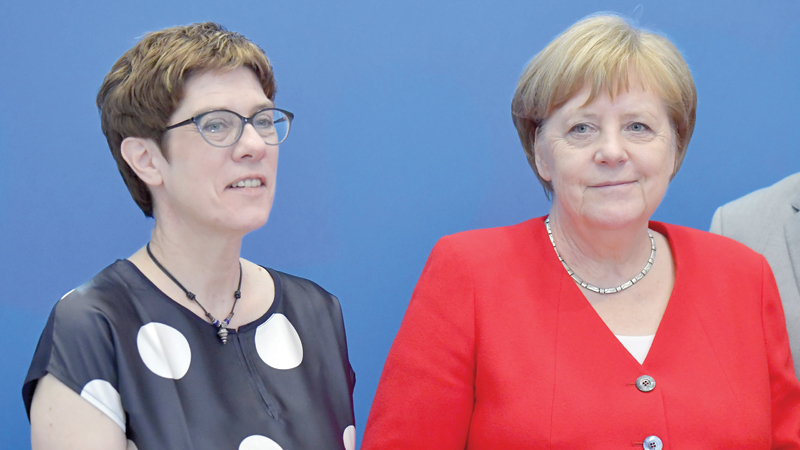

BERLIN: Germany’s far-right AfD is indirectly responsible for the suspected extremist killing of a pro-migrant politician, Chancellor Angela Merkel’s party charged Monday, warning members against any form of cooperation with the party.
In a position paper, the top brass of Merkel’s centre-right CDU sought to snuff out any talk of a possible partnership with the AfD.
Speculation of such an alliance has repeatedly surfaced, and recently, several local CDU politicians have voiced the possibility as the far-right party is poised to gain significant ground in three state elections later this year.
On Monday, the CDU’s leadership sought to stamp out any such musings at the regional or local level.
“Anyone who makes a case for a rapprochement or even cooperation with the AfD must know that he is seeking rapprochement with a party that consciously tolerates far-right thinking, anti-Semitism and racism in its ranks,” the paper said.
The CDU also vowed to “deploy every possible means” to block any possible alliance with the AfD.
Pointing to the June 2 killing of local politician Walter Luebcke, believed to have been carried out by a far-right sympathiser, the CDU said the AfD had contributed to inciting such extremist hatred.
The “propagandists of hate and exclusion laid the path for violence,” the paper said, adding that “leading representatives of the AfD and not least its members participated in this consciously”.
They therefore carry “responsibility for the targeted poisoning of the societal climate and the coarsening of the political discourse” in Germany, it said.
Anyone who backs the AfD must know that they are “then consciously also accepting far-right hate and incitement, extreme polarisation and personal defamation.”
Railing against Merkel’s decision in 2015 to let in more than a million asylum seekers to Germany, the AfD scooped 13 per cent of the vote in the 2017 general election.
Coalition building has become significantly more difficult in Germany since the AfD entered the national parliament after the last general election.
Kramp-Karrenbauer said the AfD had contributed to an environment in which violence including the murder of local politician Walter Luebcke had become possible.
Luebcke was shot dead on June 2 at his home in the district of Kassel. A suspect is in custody for the crime. The federal prosecutor’s office says the crime had a right-wing extremist background.
Saxon Premier Michael Kretschmer waded into the debate on Monday, saying of a possible coalition: “It’s not possible. The party is divisive, it is not good for Germany.”
Alice Weidel, the AfD’s parliamentary group leader, responded to the comments by implying that there were members of the CDU who are in favour of closer cooperation or a coalition with the AfD. Kramp-Karrenbauer’s refusal to work with the AfD “is dividing the CDU,” Weidel said.
Since its entrance into the Bundestag, the far-right party has repeatedly sparked scandals, including its leaders challenging Germany’s culture of atonement over World War II and the Holocaust.
Meanwhile, Merkel’s Bavarian allies have called for Germany to phase out coal by 2030 but the government has insisted on keeping its 2038 target, in the latest sign of strain within her coalition. The call by Markus Soeder, the premier of Germany’s economic powerhouse state of Bavaria, could further test Merkel’s right-left coalition administration which has been shaken by policy disputes and dire results in European Parliament elections.
“The German climate targets could be reached by 2030 only if we massively speed up the coal exit,” Soeder, whose CSU is the sister party of Merkel’s Christian Democrats (CDU), told the Muenchener Merkur newspaper. — Agencies
Oman Observer is now on the WhatsApp channel. Click here



